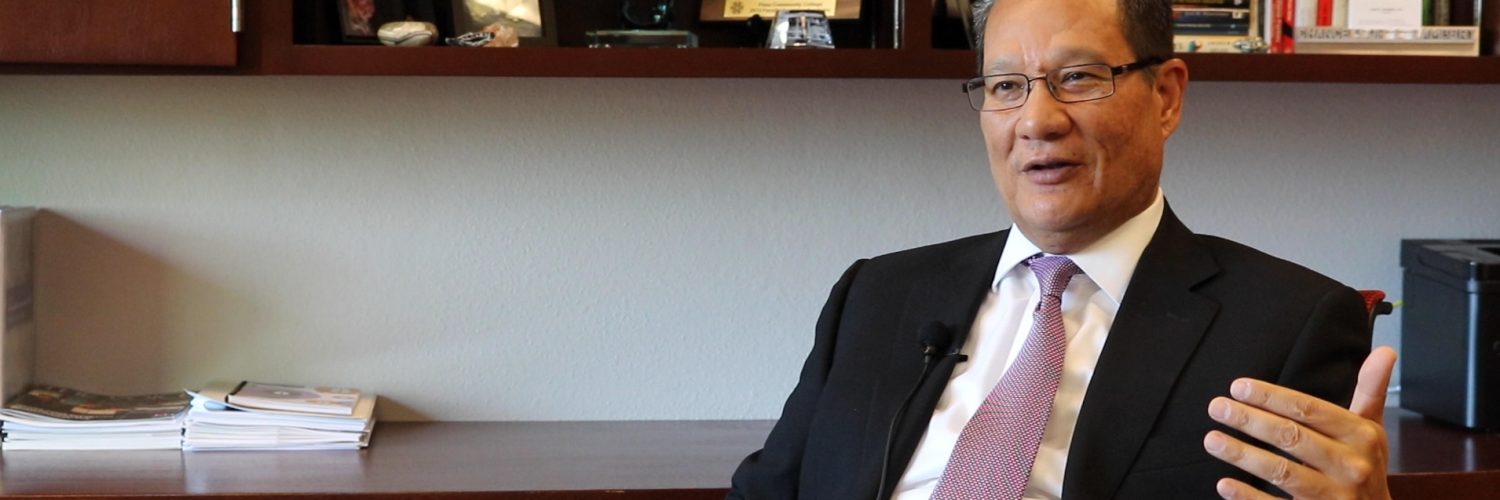“From very early on in my childhood, I realized that I wanted to do something that made a positive and meaningful difference in the lives of others,” Lee Lambert said.
Lambert has been chancellor of Pima Community College in Tucson since 2013. Before transitioning to work in the two-year college system, he worked on the president’s staff at Evergreen State College, a four-year college in Olympia, Washington.
He said when he interviewed for the job at PCC, one thing stood out to him right away.
“This is a community where each and every individual cares deeply about this college and what it means for the community, and really, for all the individuals in the community,” he said. “I think it’s that specialness about the community itself that really draws students here, to want a better life for themselves and their families.”
Lambert said his favorite part of the job is meeting people from all walks of life.
“I could be talking to a CEO of a company one moment; next moment, I’m talking to somebody who is from a local high school or from a local community organization,” he said.
PCC is a diverse institution — 45 percent of its students are Hispanic, or Latinx, and another 10 percent are black, Asian-Pacific Islander or Native American, Lambert said.
“We’re a very diverse population, and I haven’t even mixed in religion and veterans, LGBTQ, so you have a lot of other components that make up the diversity of the college,” he said.
One of the primary missions at PCC is to balance both access and student success, two equally necessary pieces of the educational puzzle, according to Lambert.
“You can’t get to success if you don’t have access; access is not enough to get you to success,” he said. “We balance those two pieces out, and that ensures that we have a diverse student body by being open to the entire community having access.
“I want to make sure that people who come here ultimately reach their hopes and dreams, goals and aspirations, which leads to the success portion.”
PCC has six campuses in Tucson and partners with other locations to provide more opportunities to students. Each campus has its own culture and atmosphere, Lambert said.
“You can go to one location and have a different kind of experience than when you go to a different location,” he said. “That creates a challenge for us, but also it creates a great opportunity, that each part of our community can have their own identity expressed through our campuses or through our other locations.”
At the West Campus, for example, PCC students will find themselves learning alongside Northern Arizona University students, because PCC has a “strong partnership” with the university, Lambert said.
Commitment to communities is top-of-mind for Lambert, who is originally from the Seattle area. He considers Paul Allen and Bill Gates, co-founders of Microsoft, as inspirational leaders in that realm.
“They first set up Microsoft in New Mexico, but they decided to move back to the Seattle area,” Lambert said. “Why that’s important is a commitment to your own community. If you grew up somewhere, and you like that particular area, you have a way to impact that area.”
People’s choices can have far-reaching implications, and Paul Allen and Bill Gates transformed the Seattle area significantly by moving what is now a trillion-dollar company back to Redmond, Washington, east of Seattle.
“I look for leaders like that, who I may not personally know, but I know by their choices that they understand the implication of those choices and what it can do for a community,” Lambert said.
Listening to the needs of the Tucson community has been one of Lambert’s greatest accomplishments at PCC, he said.
“When I first arrived here, I kept hearing repeatedly that it’s too difficult to navigate the college,” he said. It seemed students and partner businesses did not know who to talk to about their needs.
In response, Lambert created a new position — vice president for workforce.
“That became the single point of contact for the business community here to interact with Pima Community College, and as a result of that, we’ve been doing some amazing things here at the college,” he said. “Just by simply listening to the voices of the people… you can now define important solutions. That can be transformative, and that’s exactly what’s happening, and that’s what I’m very proud of.”
Lambert credits the PCC governing board for supporting the college’s vision and direction, allowing PCC to focus on future technologies and industries.
“They become key and critical to my ability to drive the direction because the direction you’re seeing us take is disruptive,” he said. “It’s change.”
Change upsets the status quo, and that can be concerning to some people, but a strong group of individuals — including the governing board members — can help administer change, he said.
“On a personal level, I’m fortunate to have grown up with parents who actually moved me nine different times in 18 years, spanning three continents, four U.S. states and four countries,” Lambert said. “So, my life has been disruptive, and I’ve gotten the chance to be around different cultures.”
When he was younger, Lambert was a football player. He is not a “big guy” by his own account, but he was fast and had “a lot of heart,” he said.
“And really, when you think about what I’ve had to lead through here, it’s required all of that, right?” he said. “Have a big heart, work hard, understand every detail, every option that’s out there. That all comes from just being someone who loved football.”
As a Seattle native, Lambert is a fan of the Seahawks football team. Interestingly, Paul Allen of Microsoft owned the National Football League team from 1996 until his death in 2018, guiding the team to three Super Bowl championship games and one Super Bowl win during that time.
Lambert said he still draws upon his prior experiences — things he has read, people he has met and places he has been — to decide what to do next.
“There’s not just one thing that I can point to, but to realize that you take the sum total of your experiences, channel them through your values and belief system, and then out of that comes the way you approach your life or your leadership, or my passion,” he said. “That leads to, I think, some of the positive things you’ve seen happening here at the college.”
















Add comment